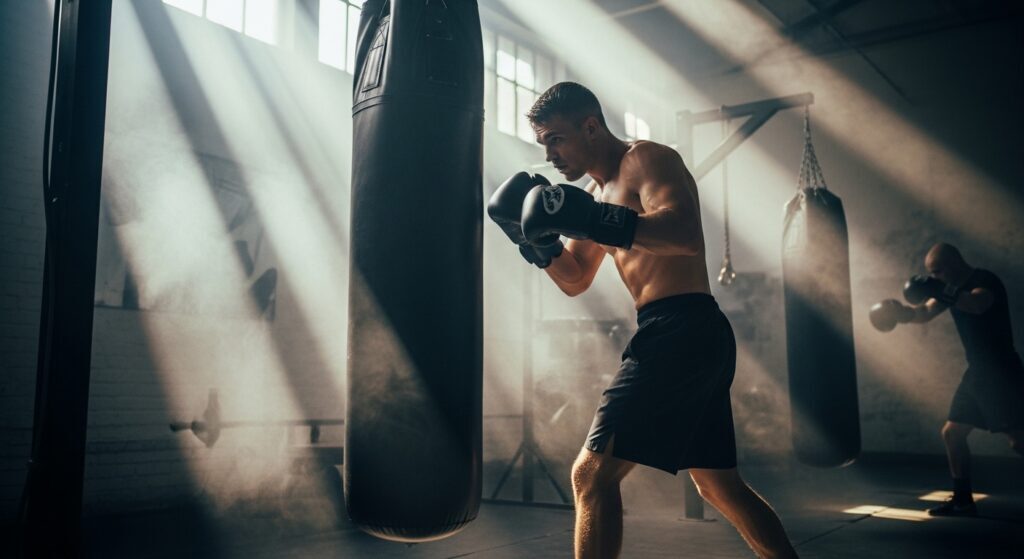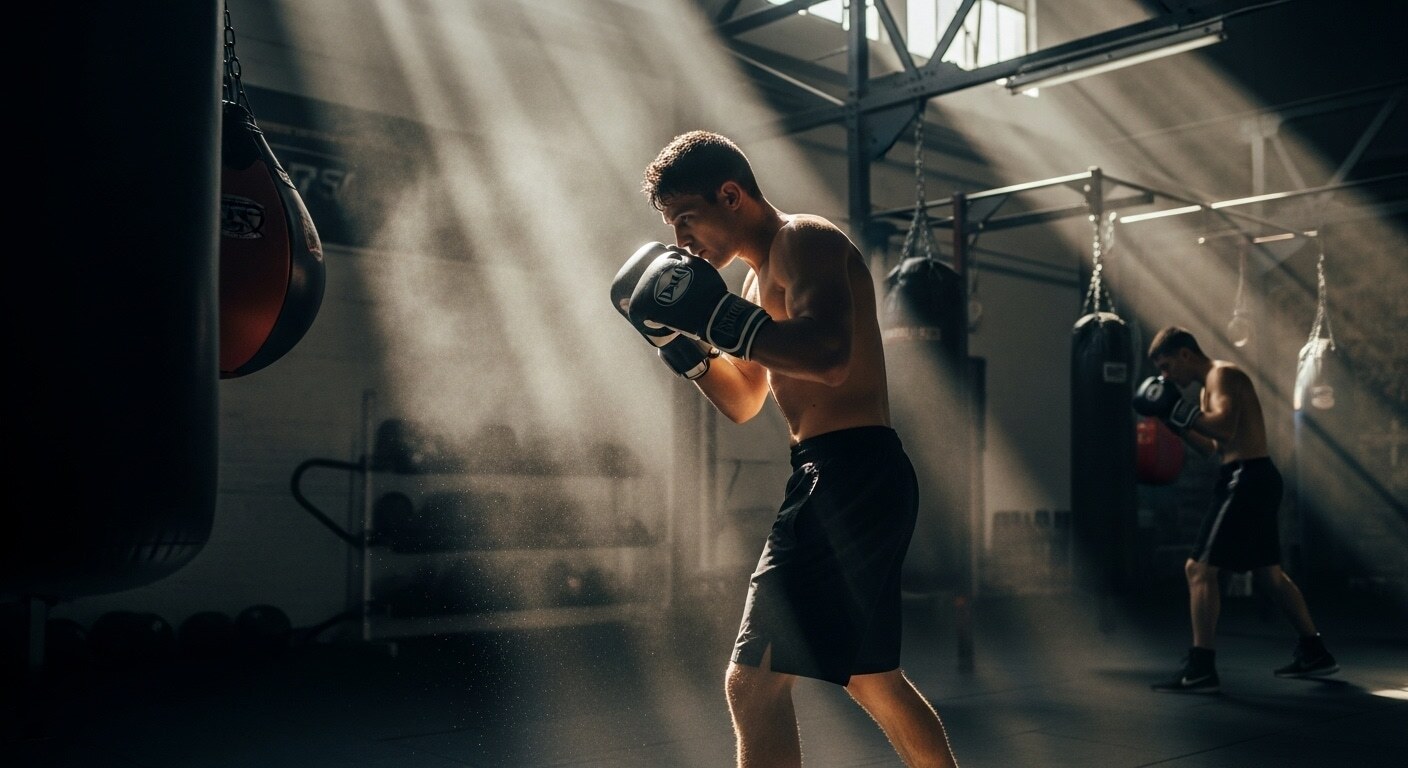“Champions are made from something they have deep inside them – a desire, a dream, a vision.” – Muhammad Ali. Starting out in boxing sparring can be thrilling yet scary. You’re about to start a journey that will make you healthier and more confident.

This guide will teach you the basics of safe boxing sparring. It will help you get better at boxing workouts and reach your fitness goals with at-home boxing exercises.
Key Takeaways
- Understand the critical equipment needed for safe boxing sparring.
- Learn how to incorporate sparring into your routine effectively.
- Master fundamental techniques to improve your performance.
- Discover how to boost your confidence through boxing.
- Enhance your overall fitness with at-home boxing exercises.
Essential Equipment for Safe Boxing Sparring
To ensure a safe and effective boxing workout routine, the right equipment is key. You need to gear up with the right protective equipment to minimize injury risk during intense boxing training.
Protective Gear You Can’t Skip
Protective gear is your first defense against injuries. It’s important to invest in high-quality gear that fits well and protects you.
Mouthguards and Groin Protection
A mouthguard protects your teeth and mouth from impact. For men, groin protection is also essential to prevent serious injuries. Both are non-negotiable for safe sparring.
Hand Wraps and Their Proper Application
Hand wraps provide wrist support and protect your hands during intense boxing training. Learning how to wrap your hands correctly is vital to prevent injuries and ensure a solid foundation for your punches.
- Start by wrapping your wrist to provide support.
- Ensure your knuckles are protected without restricting your movement.
- Secure the wrap tightly but not too tight to cut off circulation.
Choosing the Right Gloves and Headgear
Boxing gloves and headgear are critical for protecting your hands and head. Choose gloves that fit snugly and provide adequate padding. Headgear should protect your face and head without obstructing your vision.
Gym Essentials for Sparring Sessions
Familiarizing yourself with gym essentials like the heavy bag and speed bag will enhance your boxing workout routine. These tools help improve your technique, endurance, and overall performance.
By investing in the right equipment and understanding how to use it, you’ll be well-prepared to dive into sparring sessions safely and effectively.
Incorporating Sparring into Your Boxing Workouts
Adding sparring to your boxing workouts can boost your skills and technique. It’s important to know how to mix sparring with other training parts.
Warm-up Routines Before Sparring
A good warm-up is key before sparring. Start with shadow boxing workouts to warm up your muscles and work on your technique. Jumping jacks and light cardio also raise your heart rate and get your body ready.
Balancing Sparring with Other Boxing Exercises
It’s important to balance sparring with other boxing exercises. This means doing bag work to sharpen your punches and pad work to boost your hand-eye coordination and quickness. A balanced routine helps you improve all around, not just one skill.

Cool-down and Recovery Techniques
After sparring, it’s essential to cool down and use recovery methods. Stretching helps reduce muscle soreness and keeps you flexible. Foam rolling and staying hydrated also help with recovery and getting ready for the next session.
| Training Phase | Exercises/Techniques | Benefits |
|---|---|---|
| Warm-up | Shadow boxing, jumping jacks, light cardio | Prepares muscles, improves technique, increases heart rate |
| Balancing Exercises | Bag work, pad work, sparring | Enhances punching technique, hand-eye coordination, overall skill |
| Cool-down & Recovery | Stretching, foam rolling, hydration | Reduces muscle soreness, improves flexibility, aids in recovery |
Fundamental Techniques for Safe Sparring
Learning the basics of boxing is key to safe sparring. These skills are essential for your safety and success in the ring. As you get better, these techniques will become second nature, letting you explore more complex strategies.
Basic Stance and Footwork
Your stance is the base of your boxing skills. Stand with your feet shoulder-width apart, with your dominant foot back. Keep your knees slightly bent and your hands up to protect your face. Good footwork is vital for moving and defending; practice shuffling, bobbing, and pivoting to boost your agility and control in the ring.
Defensive Moves Every Beginner Should Master
Defense is as important as offense in boxing. Learning defensive moves will protect you from punches and open up chances for counterattacks.
Blocking and Parrying
Blocking absorbs punches with your gloves or arms, while parrying deflects punches with your hands. Both need precise timing and positioning. For example, to block a hook, rotate your torso and use your gloves to cover your head’s side.
“The key to effective defense is not just about avoiding punches, but also about creating opportunities for counterattacks.” – Joe Frazier
Slipping and Ducking
Slipping moves your head to the side to dodge a punch, while ducking lowers your body to dodge a punch. Both help you avoid punches and set up counterattacks. Practice slipping and ducking by imagining your opponent’s punches and moving right.
| Technique | Description | Benefit |
|---|---|---|
| Blocking | Using gloves or arms to absorb punches | Protects against incoming punches |
| Parrying | Deflecting punches with your hands | Creates counterattack opportunities |
| Slipping | Moving head to the side to avoid punches | Evades punches and creates angles |
| Ducking | Lowering body to avoid punches | Evades punches and sets up counterattacks |
Controlled Offensive Techniques
While defense is key, throwing effective punches is also important. Practice your jab, cross, hook, and uppercut on a heavy bag to improve your technique and power. Remember, the goal of sparring is to throw punches in a controlled way, ensuring safety for you and your partner.
Adding these fundamental techniques to your training will greatly improve your boxing skills and make sparring safer. As you get more comfortable with these basics, you’ll be able to explore more advanced techniques and strategies.
Sparring Etiquette and Safety Protocols
Learning sparring etiquette and safety is key for a good boxing workout. It makes sure you perform well and stay safe. It’s also important for a fun time with your sparring partner.
Communication with Your Sparring Partner
Talking well is the heart of a great sparring session. Before starting, talk about how hard you want to go and any worries. This way, you both know what to expect and can adjust your moves.
Setting Appropriate Intensity Levels
Finding the right intensity is very important, more so in boxing HIIT workouts that challenge you. Start with a level you’re okay with and then get harder as you get warmer. The aim is to get better, not hurt yourself.

When to Stop and Take Breaks
Knowing when to stop and rest is key for safety in sparring. If you’re too tired or in pain, tell your partner and take a break. Listening to your body helps avoid injuries and makes your session better.
Progression Path for Beginners
Beginners need a clear plan to follow. Start with easier sessions and slowly make them harder as you get better. This way, you get the most out of your boxing HIIT workouts and stay safe.
Conclusion
Learning to spar safely takes time, patience, and the right help. Start by using the right gear and adding sparring to your workouts. Mastering basic moves will make your boxing better.
As you get better, always follow safety rules and good sportsmanship. Talk clearly with your partner, keep the intensity right, and rest when needed.
Keep training hard and you’ll get better at boxing. Focus on safety and you’ll improve your skills and fitness. You’ll enjoy your workouts more and more.
FAQ
What are the essential equipment needed for safe boxing sparring?
To spar safely, you need protective gear like mouthguards and groin protection. Also, hand wraps, boxing gloves, and headgear are must-haves. Knowing how to use gym essentials like the heavy bag and speed bag will boost your workout.
How do I incorporate sparring into my boxing workouts effectively?
Begin with a good warm-up that includes shadow boxing. Then, mix sparring with bag work and pad work. After sparring, cool down and stretch to lessen muscle soreness.
What are the fundamental techniques I should master for safe sparring?
First, learn a proper stance and footwork. Then, practice defensive moves like blocking and slipping. Also, focus on throwing punches correctly.
How can I ensure safety during sparring sessions?
Always talk to your sparring partner about how hard you want to go. Know when to stop, taking breaks during intense workouts.
What is the progression path for beginners in boxing sparring?
Beginners should have a clear plan to increase intensity slowly. This builds skills and endurance, making workouts more effective.
How can I improve my boxing technique through sparring?
Sparring improves your fitness and technique. Focus on basic techniques and safety to get the most from your workouts.
Can I do boxing workouts at home to prepare for sparring?
Yes, you can prepare at home with exercises like shadow boxing and heavy bag workouts. These improve your technique and endurance.
